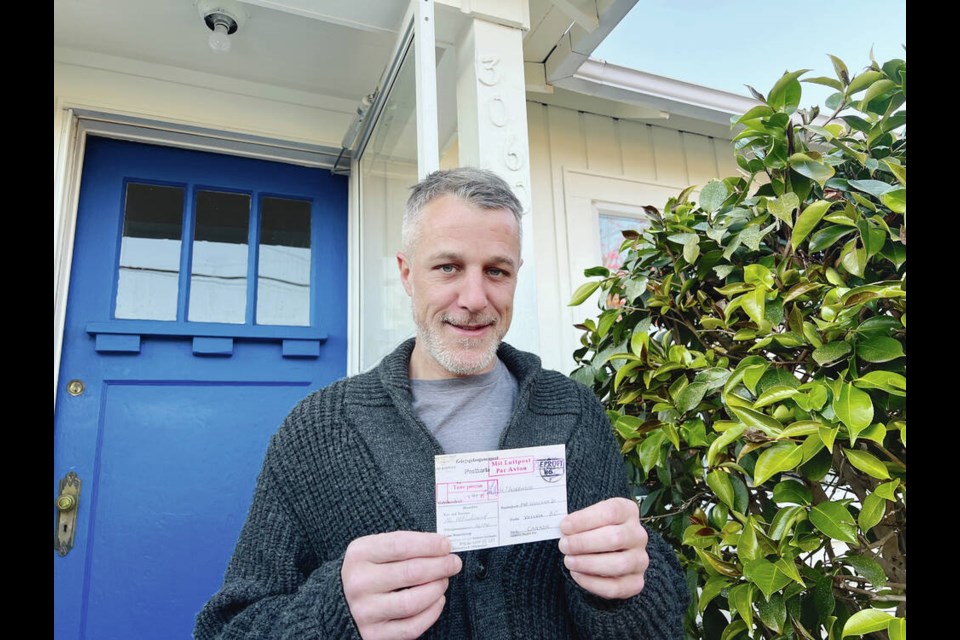Matthew Rose received a piece of history this week when he got a postcard originally sent in 1943 by a soldier being held in a German prisoner-of-war camp to his sister-in-law.
On Sept. 26, 1943, Ernest Albert (Ernie) Underwood wrote a postcard to Emily Underwood, who was living on Wascana Street in the Gorge Road area.
On Wednesday, Rose, the current occupant of the Wascana Street house, received a replica of the same postcard as part of Letters Home, an awareness campaign by the Royal Canadian Legion and the Legion National Foundation, with financial support from HomeEquity Bank.
“The postcard really brought the time from around the war home for me,” said Rose, 43. “The house, which was built around 1937, was already historical for me, but this really makes me think about what it was like at that time.”
Underwood, who was wounded and captured on the beach during the failed Dieppe raid in August 1942, was a prisoner at Stag Luft III, one of six prisoner-of-war camps operated by the German Air Force in Sagan, Lower Silesia in Nazi Germany. The camp was about 160 kilometres southeast of Berlin and housed up to 10,000 prisoners, most of them Allied airmen.
“Mail from home is very slow in getting here, but hope it won’t be long before we all meet again,” Underwood wrote on the card. “Boy! That sure will be a big day. Am in good health myself & hope all of you are the same. All the best to you & all at home.”
Born in Winnipeg in 1915, Underwood had enlisted with his brother Leslie in 1939 in Victoria. He returned home to Victoria in 1945.
Copies of letters from soldiers who fought in the First and Second World Wars sent to their original addresses include 16 in Victoria.
Through the Letters Home online portal at letters-home.ca, you can type in an address anywhere in Canada to bring up a digital map showing areas where a soldier overseas had written a letter home during both world wars.
The letters come from the Canadian Letters and Images Project, an initiative of the history department at Vancouver Island University in Nanaimo. The project has digitized letters, diaries, photographs and other related materials that provide insight into the everyday lives of individual soldiers, and offers them in a searchable format.
Dr. Stephen Davies, director of the project and a history professor at VIU, said in the past 22 years, the project has involved digitizing more than 30,000 letters and thousands of photographs. “The project is unique due to the fact that, unlike an archive or museum, we do not keep the artifacts. We simply digitize and record the item — and give the original back to the family.”
The letters, postcards and photographs are in the public domain, so anybody can access or use them for free.
“Often families are proud of their ancestors’ achievements and wish to share their story — but they still want to hang onto their heirloom. This way, it is a win-win for them and historians,” said Davies.
Of the copies of letters and postcards that arrived at their original destinations this week, one is a letter from a father to his daughter from a training camp, while another is from a soldier to his mother, informing her that he is a prisoner of war.
There are letters from sailors at sea, soldiers in England and France, and a fallen soldier’s comrade-in-arms informing a family of their son’s death in action, with the details of the service held in his honour as he was laid to rest in France.
“The incredible sacrifices of our soldiers may already seem like a century ago, which makes finding ways to share these letters and the harsh realities they contain with today’s young Canadians all the more important,” said Bruce Julian, Dominion president of the Royal Canadian Legion, in a statement.
Visitors to the Letters Home site are encouraged to dedicate a Digital Poppy at mypoppy.ca to support Royal Canadian Legion initiatives that further veterans’ health, educate youth on the contributions of veterans and provide students with scholarships and bursaries.
The Canadian Letters and Images Project is at canadianletters.ca.
>>> To comment on this article, write a letter to the editor: [email protected]



